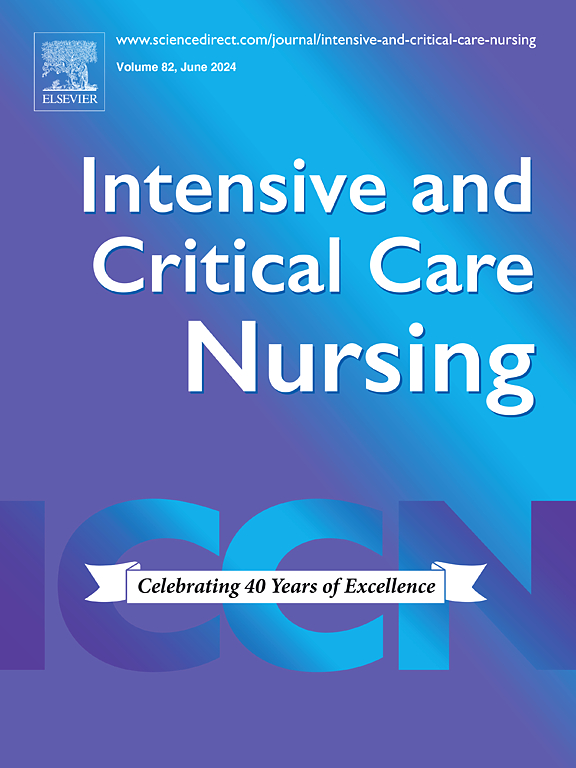ICU护士精神气候与继发性创伤应激的关系:道德弹性的中介作用。
IF 4.9
2区 医学
Q1 NURSING
引用次数: 0
摘要
背景:在护理实践中,继发性创伤应激被认为是一个重要的心理风险因素,有可能对护士的心理健康产生负面影响。然而,对ICU护士的精神气候和继发性创伤应激的机制知之甚少。目的:本研究旨在评估中国ICU护士的精神气候、道德弹性和继发性创伤应激,并探讨道德弹性是否在精神气候和继发性创伤应激之间起中介作用。方法:采用横断面研究设计,招募229名重症监护室护士。护士完成了包括人口特征、精神气候、道德恢复力和继发性创伤压力的在线问卷。采用SPSS 26.0和AMOS 24.0进行数据分析和结构方程建模。结果:STS评分为(38.42±13.27)分。继发性创伤应激与精神气候、道德弹性相关(r1 = -0.370, r2 = -0.575;结论:精神氛围对ICU护士的二次创伤应激有显著的直接影响,并可通过道德弹性降低护士的二次创伤应激。营造积极向上的精神氛围,增强ICU护士的道德韧性,是减轻其继发性创伤应激的有效方法。对临床实践的启示:本研究强调ICU护士的精神气候可以减少其继发性创伤应激,道德弹性可以减少与精神气候相关的继发性创伤应激。建立支持系统和改善环境是护理管理者的首要任务。这些措施包括但不限于改善科室的精神氛围,提供道德韧性培训,以及采取其他措施预防和调节ICU护士的继发性创伤应激,以保持其心理健康。本文章由计算机程序翻译,如有差异,请以英文原文为准。
The relationship between spiritual climate and secondary traumatic stress in ICU nurses: The mediating role of moral resilience
Background
Secondary traumatic stress is acknowledged as a substantial psychological risk factor in nursing practice with the potential to negatively impact nurses’ mental health. However, little is known about the mechanisms underlying the spiritual climate and secondary traumatic stress among ICU nurses.
Objectives
This study aimed to assess the spiritual climate, moral resilience, and secondary traumatic stress in Chinese ICU nurses and to investigate whether moral resilience mediates the relationship between spiritual climate and secondary traumatic stress.
Methods
A cross-sectional study design was used to recruit 229 intensive care unit nurses. The nurses completed online questionnaires comprising demographic characteristics, spiritual climate, moral resilience, and secondary traumatic stress. Data analysis and structural equation modeling were conducted using SPSS 26.0 and AMOS 24.0.
Results
STS scores were (38.42 ± 13.27). Secondary traumatic stress was correlated with spiritual climate and moral resilience (r1 = −0.370, r2 = −0.575; p < 0.01), and spiritual climate was positively correlated with moral resilience (r = 0.427; p < 0.01). A mediating effect of moral resilience between spiritual climate and secondary traumatic stress held (mediating effect of 0.235, 95 % CI: −2.108 to −0.823, accounting for 57.32 % of the total effect).
Conclusions
The spiritual climate has a significant direct influence on secondary traumatic stress in ICU nurses and serves to reduce their secondary traumatic stress through moral resilience. Creating a positive spiritual climate and enhancing the moral resilience of ICU nurses are effective methods to reduce their secondary traumatic stress.
Implications for clinical practice
This study highlights that the spiritual climate for ICU nurses can reduce their secondary traumatic stress, and that moral resilience diminishes the secondary traumatic stress related to the spiritual climate. Establishing support systems and improving the environment are primary tasks for nursing administrators. These include, but are not limited to, improving the spiritual climate of the department, providing moral resilience training, and taking other measures to prevent and regulate secondary traumatic stress in ICU nurses in order to maintain their mental health.
求助全文
通过发布文献求助,成功后即可免费获取论文全文。
去求助
来源期刊

Intensive and Critical Care Nursing
NURSING-
CiteScore
6.30
自引率
15.10%
发文量
144
审稿时长
57 days
期刊介绍:
The aims of Intensive and Critical Care Nursing are to promote excellence of care of critically ill patients by specialist nurses and their professional colleagues; to provide an international and interdisciplinary forum for the publication, dissemination and exchange of research findings, experience and ideas; to develop and enhance the knowledge, skills, attitudes and creative thinking essential to good critical care nursing practice. The journal publishes reviews, updates and feature articles in addition to original papers and significant preliminary communications. Articles may deal with any part of practice including relevant clinical, research, educational, psychological and technological aspects.
 求助内容:
求助内容: 应助结果提醒方式:
应助结果提醒方式:


